A traditional herbal remedy for anxiety, stress and insomnia - ashwagandha with warmed nut milk and spices. Enjoy before bed to help you unwind.
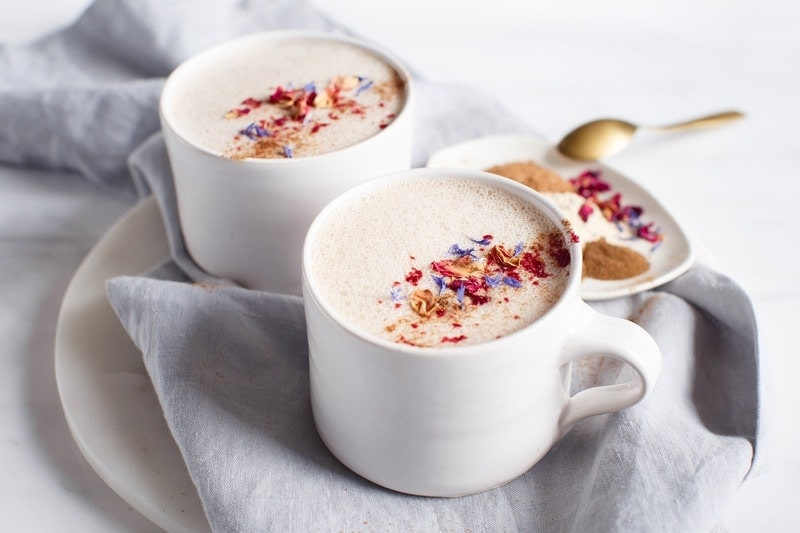
Today I have a herbal recipe to share, which in actual fact, is a modern twist on a classic Ayurvedic remedy – Ashwagandha Sleep Tonic.
Now, I hope I do justice to this beautiful herb in this post – there is so much to say – but I’m going to focus on its beneficial effects on stress, anxiety and sleep as the herb is just so complex, with a wide range of actions and indications.
I’ll start with my intentions however, which are to simply introduce you to a little of herbal medicine.
The dose of the herb used in the recipe is relatively low, but it is a lovely way to start to appreciate herbs and experience them for yourself at home.
Although the herb is taken in its powdered form here, in clinical practice we often use it as a fluid extract that has been standardised to contain a certain amount of active constituents. I actually think this would make a great alternative to your morning coffee.
Ok, let’s begin!
[bctt tweet="Ashwagandha Sleep Tonic – a modern take on the classic Ayurvedic recipe. Find it here." username="laurenglucina"]
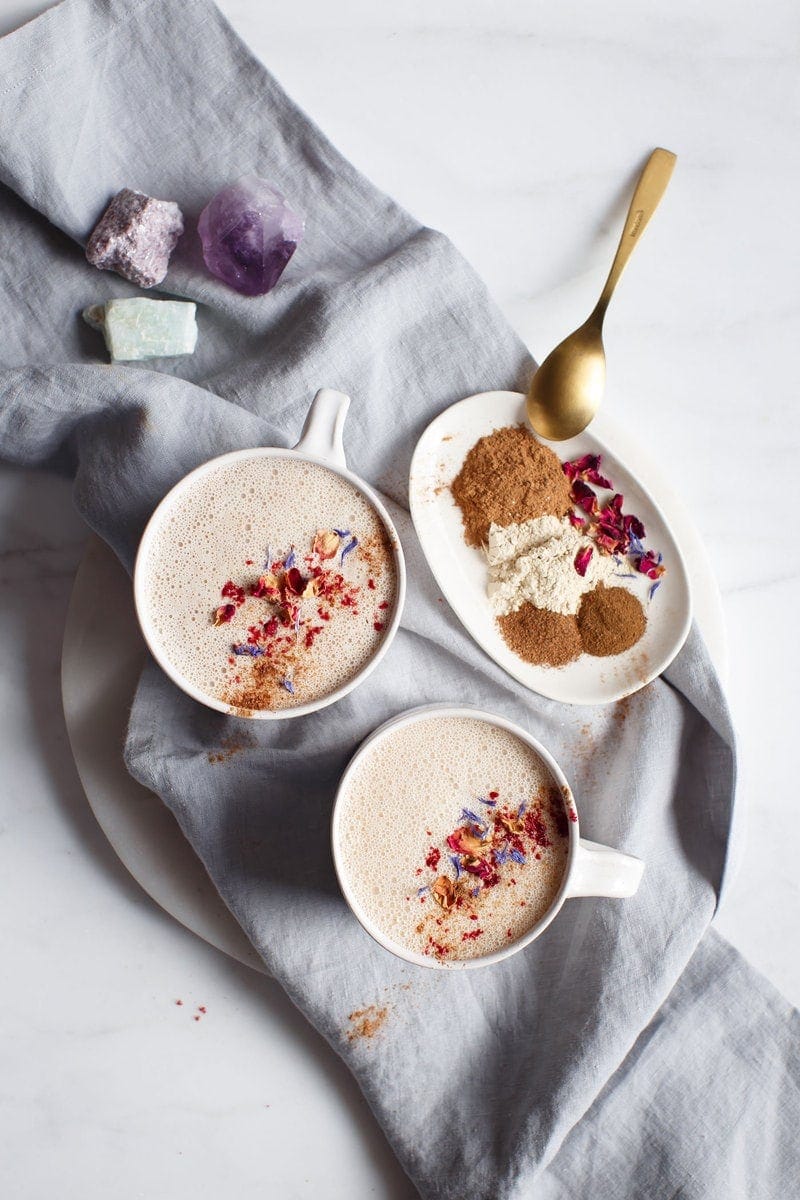
Ashwagandha
Ashwagandha, which also goes by the names of Indian ginseng and winter cherry (and botanically, Withania somnifera), is a plant in the Solanaceae (nightshade) family.
In Sanskrit, ashwagandha translates as the smell of the horse – this is firstly due to its strong aroma and secondly to its reputation for imparting strength and virility. The Latin translation for the herb’s botanical name, somnifera, is ‘sleep-inducing’.
In Ayurvedic medicine, is it classified as rasayana – a rejuvenator – used to restore health and wellbeing and promote longevity. It has been used for centuries to alleviate stress, anxiety and fatigue, and is regarded as a general all-purpose tonic.
This small, woody shrub grows in India, Africa and the Mediterranean, and the part used therapeutically is the root [1].
Recent clinical research has shown ashwagandha to play a role in treating stress, anxiety, depression and insomnia. It has also been studied for its cognitive enhancing, neuroprotective, antioxidant, antibacterial, antifungal, anti-inflammatory, immune-modulating, anti-cancer, cardio-protective, and thyroid modulating effects (Braun & Cohen, 2015).
Ashwagandha is classed as a tonic, mild sedative and adaptogen in herbal medicine. The latter means it has the ability to help a person better cope with stress. This makes it an attractive ally in today’s modern world where so many of us are over worked and over stimulated.
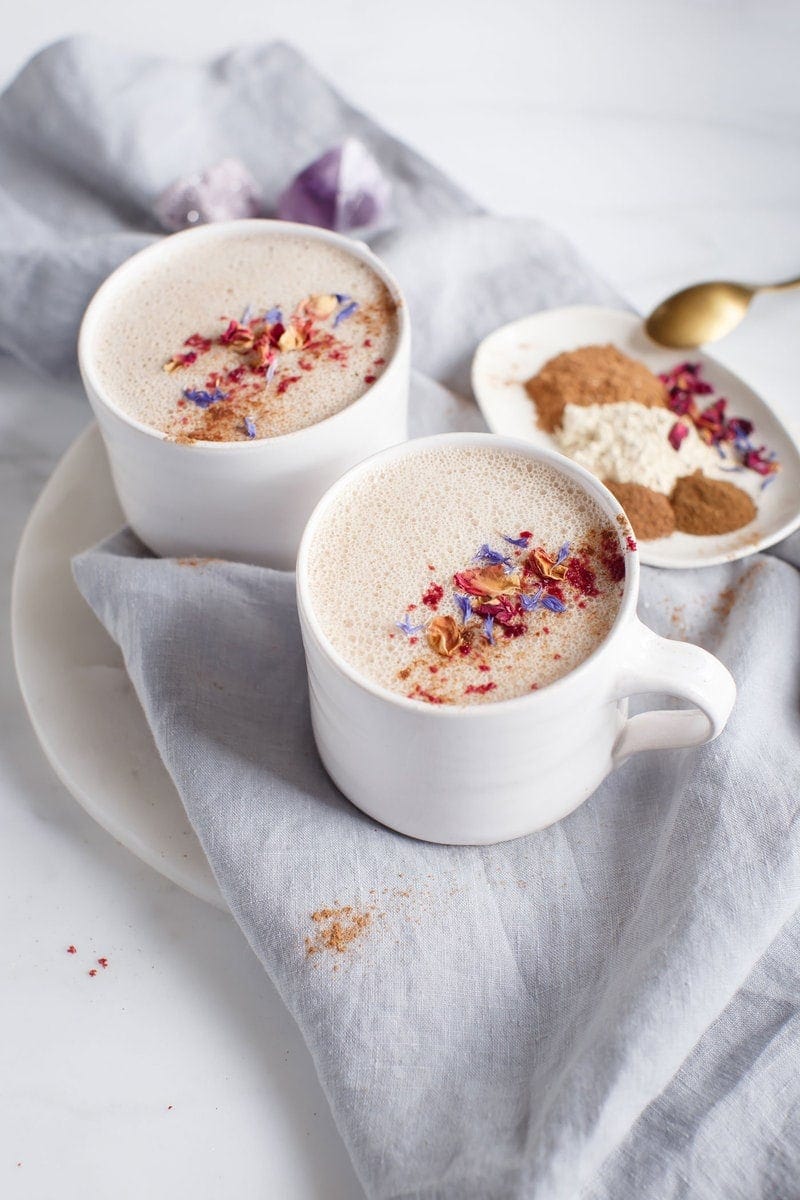
Studies on Ashwagandha for Sleep and Stress
To highlight a few human studies done on ashwagandha and its effects on stress, anxiety, insomnia and general wellbeing:
In an uncontrolled study in 1992, a small group of trainee mountaineers were given ashwagandha daily over 29 days, and reported improved sleep patterns, responsiveness, alertness and physical capabilities (Bone & Mills, 2013).
A small 2008 study with patients diagnosed with general anxiety disorder, found the herb to be a well-tolerated anxiolytic, reducing anxiety significantly by week 6 of treatment [2].
In a double-blind, placebo-controlled study (2008), 130 chronically stressed patients randomly received placebo or an ashwagandha root and leaf extract. After 60 days, the ashwagandha group showed a significant decrease in anxiety as assessed by questionnaires [3].
There were also biochemical parameters measured. Those in the treatment group showed significantly reduced serum cortisol (a marker for stress) and CRP (a blood marker for inflammation), with reductions in fasting blood glucose, pulse rate and blood pressure, improved cholesterol markers, and increases in DHEAS (a hormone produced by the adrenal glands) and haemoglobin [4].
A 2012 prospective, randomised double-blind, placebo-controlled study, of 61 adults with a history of chronic stress (such as doctors, students, executives and those that ran their own businesses) were assigned either to a placebo group or a treatment group – where they took a high-concentration full-spectrum extract of ashwagandha root, for a 60-day period [5].
Those taking ashwagandha had a significant reduction in all stress-assessment scales (which were various questionnaires that assessed their perceived stress, anxiety, insomnia, depression and general wellbeing), in addition to a reduction in serum cortisol by 27% compared to baseline [6].
In an exploratory study on healthy volunteers in 2012, 6 out of 18 participants taking incremental doses of ashwagandha over a 30 day period reported improvement in quality of sleep, supporting the traditional use of the herb as a sleep promoter [7].
There are also, of course, a plethora of animal studies available on the therapeutic effects of ashwagandha.
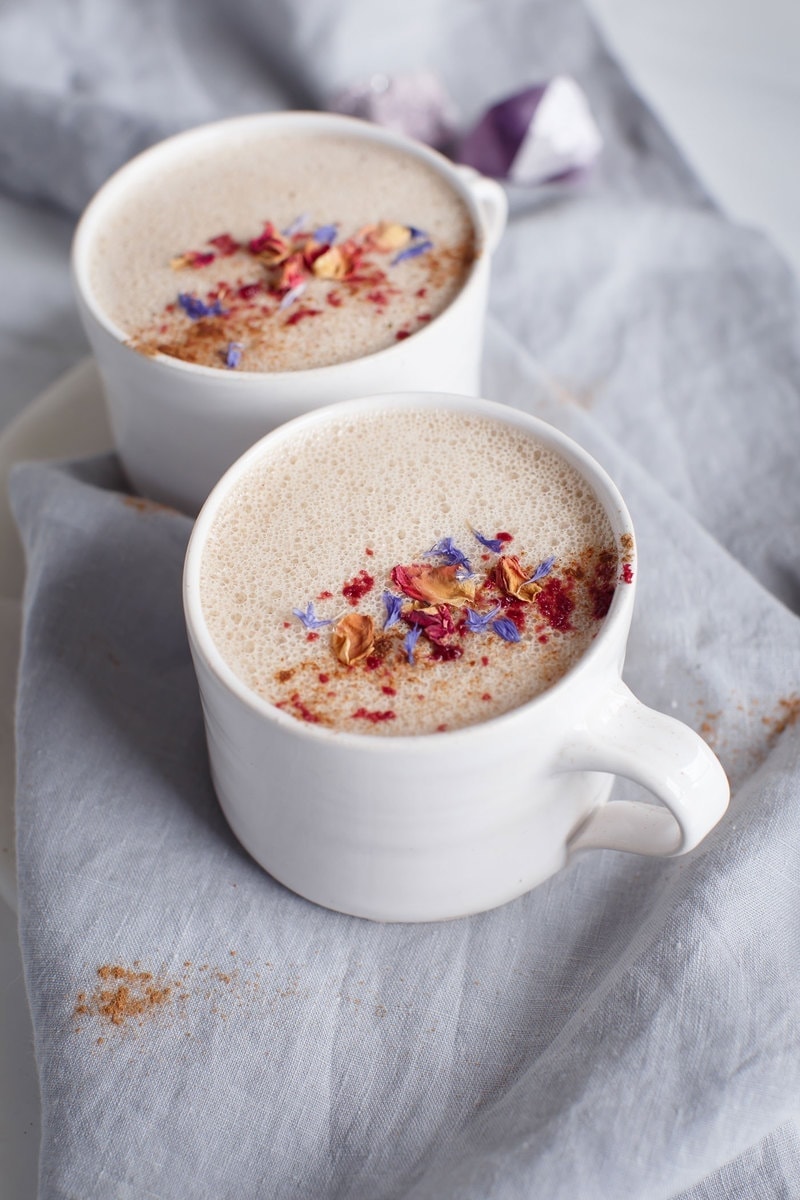
My personal experience
I took ashwagandha in combination with a few other herbs that support the nervous system during my last year of studies, where I was completing two courses simultaneously, deeply immersed in the student clinic, writing for the blog and in the throws of setting up a new business.
To say that things were overwhelming is a bit of an understatement! Fortunately, I believe the herbs I was taking were incredibly supportive.
I can speak directly to ashwagandha as I had also taken it as a simple (that is, taken it therapeutically as a single remedy, without blending it with other herbs) for part of that time. This is a great way to get to know a herb!
I have to say my overall resilience improved, and despite it being an incredibly challenging year, I felt in control and able to cope.
My sleep pattern improved and I was waking feeling refreshed, with enough energy to exercise regularly – even if it were only a power walk around the neighbourhood. It seems to be far less stimulating than the other adaptogens – it gives a very gentle, relaxed energy.
I've since turned to ashwagandha on and off, typically in combinations with other adaptogens and nervines, for stress support during periods of intensity as needed.
Safety
Ashwagandha is generally well tolerated, and regarded as safe when taken within the therapeutic dosage range (3-6g daily of the dried root powder) [8]. There are no known contraindications (Bone & Mills, 2013), however, it is a herbal medicine, and should be used with care.
Please consult a qualified medical herbalist or naturopath if you are pregnant, breastfeeding or on medications.
A caution, it is best avoided by those with known sensitivities to members of the solanaceaea family.
Finally, being a mild central nervous system depressant, ashwagandha should not be taken with alcohol, sedatives or anxiolytics as it can potentiate the effects of these.
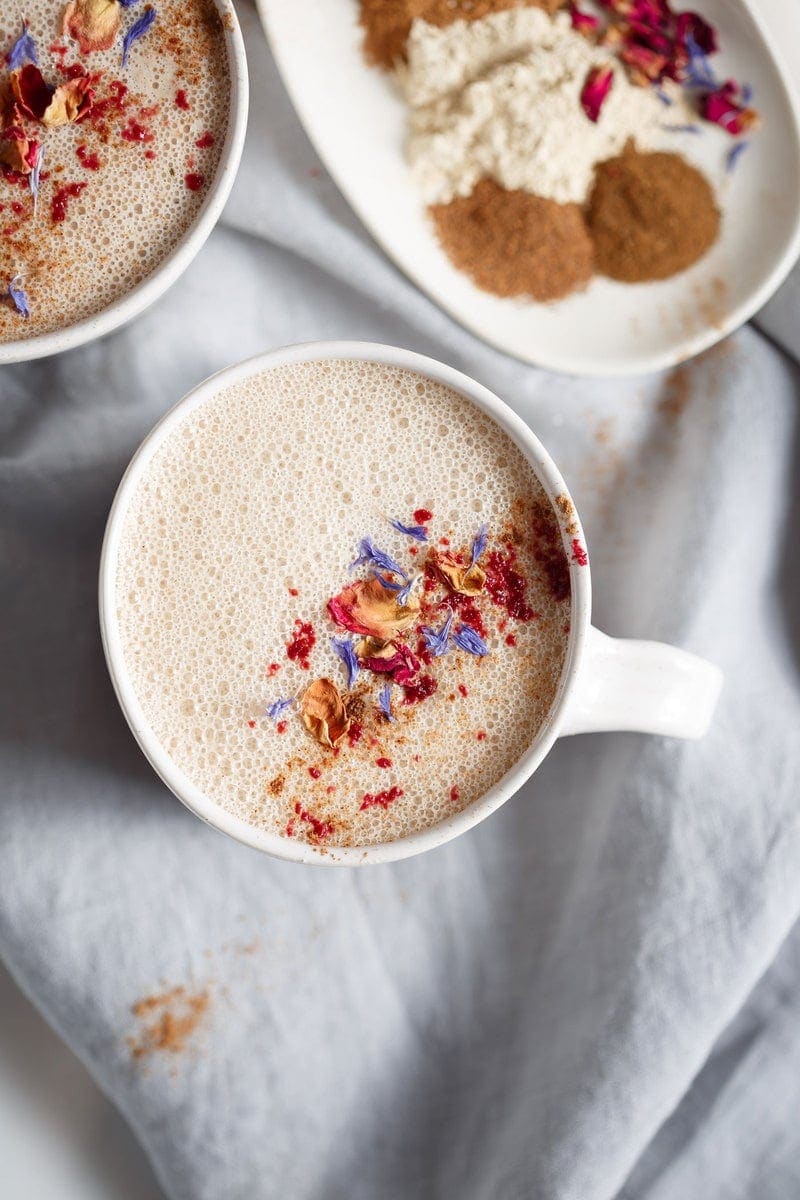
The recipe
It is an old Ayurvedic remedy – the classic combination of ashwagandha root, milk and honey, taken before bed to promote restful sleep.
I’ve modernised it somewhat: in place of the dairy milk, I’ve used whole macadamia nuts, blended with water till smooth and creamy. Unlike other nuts (almonds, cashews), you don’t need to strain them after blending, which makes it super quick and convenient.
I added some aromatic spices to the mix – cinnamon, clove and nutmeg, half a vanilla bean, a pinch of sea salt and a whole Medjool date to sweeten. Once you've blended all of the above, you heat it gently on the stove before serving.
If using honey, I suggest using one with a UMF factor to get some added therapeutic goodness, and stir it in once the mixture has cooled slightly.
You may also like to try this recipe with almonds as they contain tryptophan – an essential amino acid that can promote sleep (again – I prefer not having to strain the milk!).
Best enjoyed an hour or so before bed or – I’m going to break the mould here – enjoy it as great coffee alternative in the morning – again, it is that relaxing-energy of the herb that makes it suitable for any time of the day.
Finally - you'll likely find the herb sold as the powdered root in a health food store.
Happy experimenting!
STRESSED, EXHAUSTED & NOT SLEEPING?
Stress and stress-related disorders such as insomnia are an area of interest to me professionally as a Naturopath, Medical Herbalist and Nutritionist. If you would like a holistic approach to managing stress, sleeping better and getting your energy back, please come and see me in clinic. More information on consultations here.
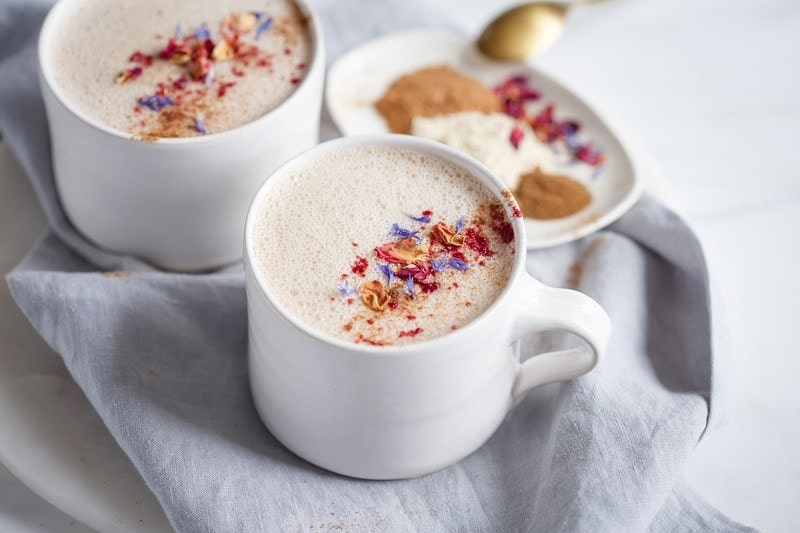
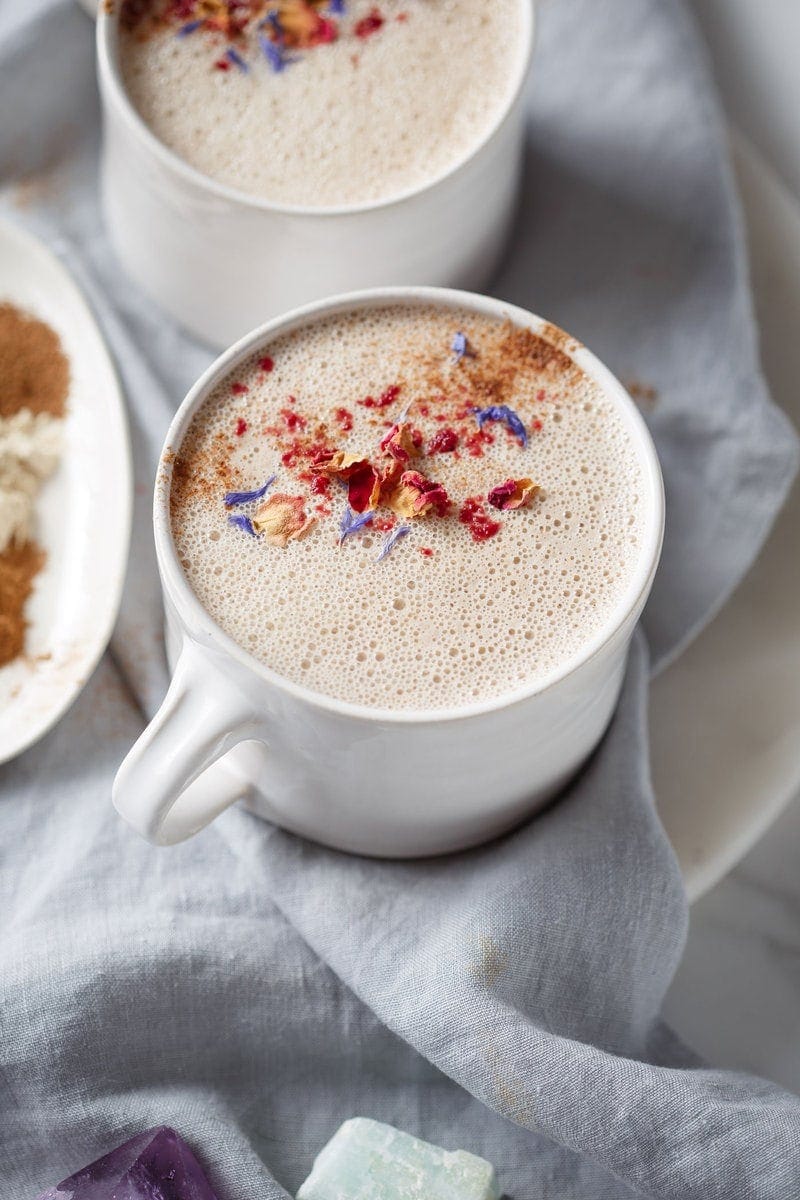
If you make and enjoy this recipe, please leave a rating below. And better yet – leave me a comment to tell me how you got on, or just say hi – I LOVE hearing from you. Follow me on Instagram, Facebook or Pinterest to see more of my everyday recipes and wellness tips.
If you’d like to chat with me about essential oils, or book in a class, you can do that here. If you’re after a Naturopathic consult, read more here.
📖Recipe
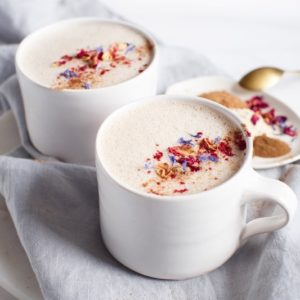
Ashwagandha Sleep Tonic
Ingredients
- 1 cup + 2 tablespoons water
- 2 heaped tablespoons raw macadamia nuts
- 1 Medjool date or a teaspoon of raw Manuka honey
- ¼ - ½ teaspoon cinnamon powder
- 2 pinches of nutmeg powder
- 2 pinches of clove powder
- Pinch of fine sea salt
- 1/3 – ½ vanilla bean
- 1 teaspoon ashwagandha root powder equivalent to 1g
Instructions
- Add all ingredients (even the vanilla bean – no need to scrape the seeds out) in a blender and whizz till smooth and creamy. Transfer to a pot and heat gently.
- To serve, add a sprinkle of cinnamon powder. In my photos, I used cinnamon, freeze dried plums, dried rose petals and cornflowers.
Nutrition

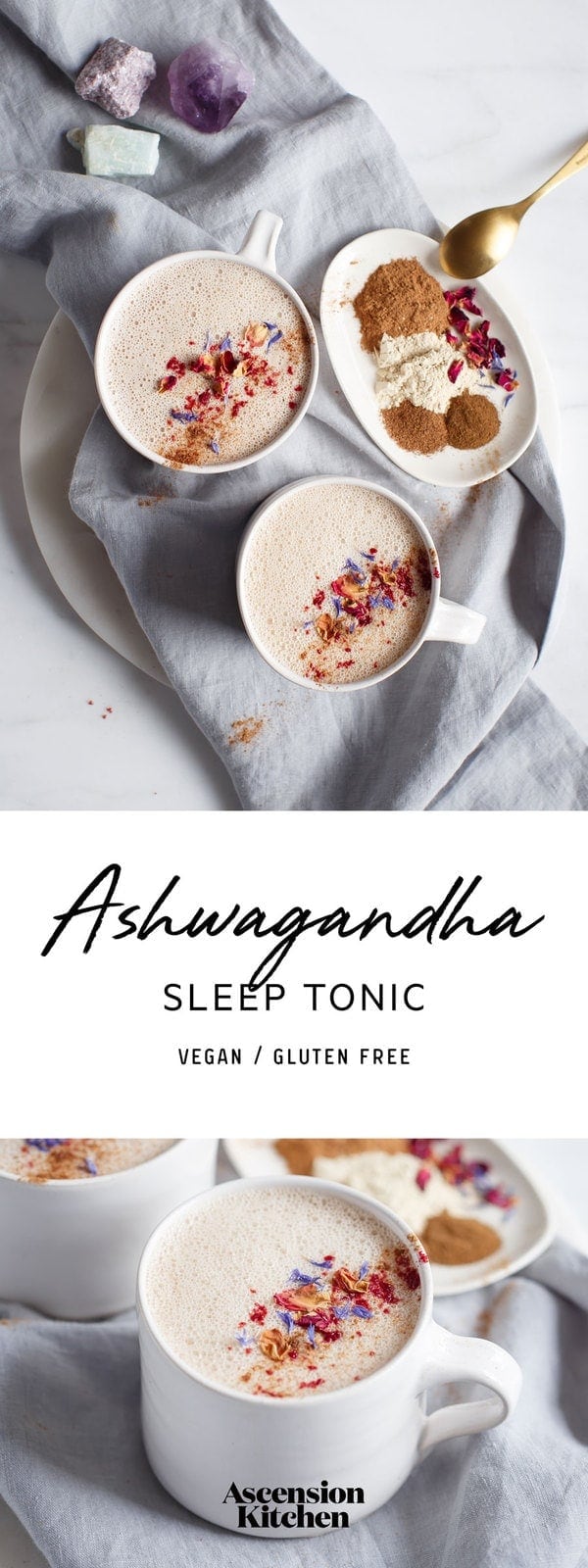



Marc Kraft
This looks amazing! Thank you for sharing 🙂
Kathy Buchholz
I take 10 mg of a generic lexipro for anxiety daily. Would that have an adverse effect?
Jon
Oh wow, the write up and visuals in this article are amazing. I've been researching natural alternatives for sleep and anxiety and there are many amazing herbs backed up by scientific studies. Tin foil hats aside, it's not hard to guess why anti depressants / anxiety pills are still being pushed!
There's a really good supplement by Nutrition Blends called the Inner Peace Formula (http://www.NutriSleep.info) - which contains a combination of the most researched herbs for sleep and anxiety. Nature has everything we need.
Warrior Strong Wellness
Amazing write-up!Nice info
Harmony
Hi Lovely, Where did you find the freeze dried plums? Gorgeous presentation!
Sally Robson
where do you get your ashwagandha root powder from?
Ascension Kitchen
I used the Ceres Organics brand, from a whole foods/organic store, Lauren.
Valentina | The Blue Bride
I started drinking golden milk with added Yin Powder from Sunpotion - which also contains ashwagandha and I can say: I've never slept better!
Ascension Kitchen
Oh that sounds amaze - would love to try their products!